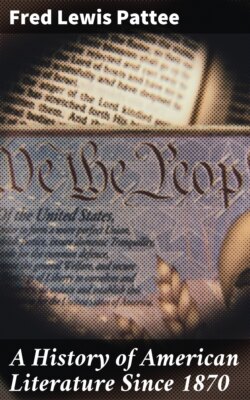Читать книгу A History of American Literature Since 1870 - Fred Lewis Pattee - Страница 26
На сайте Литреса книга снята с продажи.
ОглавлениеEverywhere he strikes out at sentimentality. When he learns how Abelard deliberately sacrificed Héloïse to his own selfish ideals, he bursts out: "The tons of sentiment I have wasted on that unprincipled humbug in my ignorance! I shall throttle down my emotions hereafter, about this sort of people, until I have read them up and know whether they are entitled to any tearful attentions or not." He is eager to see a French "grissette," but having seen one, bursts out in true Artemus Ward fashion: "Aroint thee, wench! I sorrow for the vagabond student of the Latin Quarter now, even more than formerly I envied him. Thus topples to the earth another idol of my infancy." The story of Petrarch's love for Laura only fills him with pity for the outrageously treated "Mr. Laura," the unknown husband of the heroine, who bore the burden but got none of the glory, and when they tell the thrilling legend of the old medieval castle, he makes only the comment, "Splendid legend—splendid lie—drive on!"
It was a blow at the whole school of American travel writers; it marked the passing of an era. Bret Harte in the first volume of the Overland Monthly (1868), was the first to outline the Western standpoint:
The days of sentimental journeyings are over. The dear old book of travel … is a thing of the past. Sentimental musings on foreign scenes are just now restricted to the private diaries of young and impressible ladies and clergymen with affections of the bronchial tubes. … A race of good humored, engaging iconoclasts seem to have precipitated themselves upon the old altars of mankind, and like their predecessors of the eighth century, have paid particular attention to the holy church. Mr. Howells has slashed one or two sacred pictorial canvases with his polished rapier; Mr. Swift has made one or two neat long shots with a rifled Parrott, and Mr. Mark Twain has used brickbats on stained glass windows with damaging effect. And those gentlemen have certainly brought down a heap of rubbish.[34]
It was the voice of the new West and of the new era. With The Innocents Abroad begins the new period in American literature. The book is full of the new after-the-war Americanism that did its own thinking, that saw with its own eyes, that put a halo upon nothing save genuineness and substantial worth. It must not be forgotten that America even in the new seventies was still mawkish with sentimentality. The very year The Innocents Abroad appeared, Gates Ajar sold twenty editions. Mark Twain came into the age like the Goths into Rome. Stand on the solid earth, he cried. Look with your own eyes. Worship nothing but truth and genuineness. Europe is no better than America. Como is beautiful, but it is not so beautiful as Tahoe. Why this eternal glorification of things simply and solely because it is the conventional thing to glorify them? "The critic," he wrote in later years to Andrew Lang, "has actually imposed upon the world the superstition that a painting by Raphael is more valuable to the civilizations of the earth than is a chromo; and the august opera more than the hurdy gurdy and the villagers' singing society; and the Latin classics than Kipling's far-reaching bugle note; and Jonathan Edwards than the Salvation Army."[35] The new American democracy was speaking. To the man who for four years had learned in the school of Horace Bixby there was no high and no low save as measured, not by appearances or by tradition, but by intrinsic worth.
